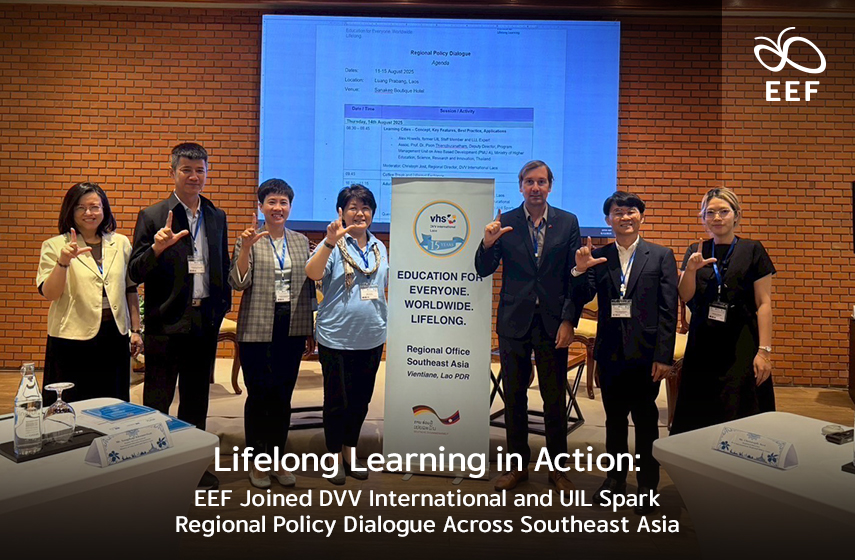
Deutscher Volkshochschul-Verband (DVV) International, in collaboration with the UNESCO Institute for Lifelong Learning (UIL) and UNESCO Bangkok, hosted the “Regional Policy Dialogue on Lifelong Learning,” at Sanakeo Boutique Hotel in Luang Prabang, Laos. The dialogue brought together senior policymakers and educational leaders from Thailand, Laos, and Cambodia to accelerate Lifelong Learning (LLL) initiatives across Southeast Asia. Key participants included delegates from UNESCO Thailand, the Equitable Education Fund (EEF) Thailand, the Program Management Unit on Area-Based Development (PMU A), and the University of Phayao, reflecting a shared commitment to expanding educational access and opportunity.

The dialogue began with “Mapping Regional Experiences and Expectations,” a platform for sharing how LLL takes shape across the three countries: Thailand’s broad national and international strategies, complemented by city-level initiatives and zero-dropout campaigns; Laos’ emphasis on rural access, teacher training, and curriculum reform through government-led frameworks; and Cambodia’s focus on multi-ministry collaboration, flexible pathways, and community knowledge transfer. Diverse as these approaches may be, they converge on two central pillars: policy development and community engagement. From this diversity emerged a shared regional aspiration: refining policies, drawing lessons, and mobilizing resources for cities and communities of learning.

Attention then shifted to strategic implementation and governance. The panel on “Policies, Strategies, and Governance Mechanisms for Lifelong Learning” explored how commitments translate into action: Thailand’s inclusive LLL ecosystem under Thailand 4.0 and SDG4, delivering 45 million learning experiences through community centers, digital platforms, and city networks; Laos’ birth-to-death LLL system offering 400 certified courses and flexible, women-focused pathways; and Cambodia’s adult learning and workforce development framework through ALE-certified training and alternative education routes. Across all countries, common threads emerged: inclusivity and equity, digital expansion, and integrated pathways. Yet recurring barriers—low awareness, scarce resources, and fragmented systems—underscore the need for stronger frameworks, broader engagement, and deeper partnerships. What began as diverse national efforts now formed a regional platform, aligning local needs with global momentum.
The “Lifelong Learning Implementation” session broadened the focus to regional integration. ASEAN serves as a bridge, translating national lessons into collective strategies for workforce development, gender equity, and SDG alignment. Policy dialogue, cross-border exchange, and coordinated action were recognized as enabling learning from both successes and missteps, supported by UNESCO and DVV. From these discussions emerged a central conviction: LLL is cross-sectoral, all-age, and inherently regional—a driver of sustainable development that calls for harmonized frameworks to turn individual initiatives into shared progress, while balancing ambition with uneven capacities across countries.

Building on this regional foundation, universities were then highlighted as engines of transformation. The “University Collaborations to Support Lifelong Learning” session illustrated how higher education anchors governance, collaboration, and innovation: Thailand’s community-based networks and city-wide projects with the University of Phayao guiding over 34 pilot cities in alignment with UNESCO frameworks; Laos’ institutional and teacher development with the National University of Laos supporting teacher preparation, non-degree and master’s programs, and international partnerships; and Cambodia’s personnel professionalization with the Royal University of Phnom Penh certifying staff and fostering exchanges to elevate institutional standards. In each case, universities were acknowledged for adapting LLL frameworks to local realities while linking them to regional and global agendas.

Finally, the dialogue explored the global architecture amplifying local achievements. In the face of demographic shifts, digital transformation, climate change, and health crises, LLL has never been more vital—an urgency exemplified by the UNESCO Global Network of Learning Cities (GNLC), linking 356 cities across 79 countries as hubs of knowledge exchange and innovation. Through international conferences, thematic reports, and academy programs, the GNLC not only aligns national priorities with the SDGs but also tackles knowledge circulation, contextual adaptation, and financial sustainability—barriers common to the three countries—while bridging capacity gaps among ASEAN countries.
Leveraging the GNLC framework, Thailand’s “Learning City Network” stands out as a leading example, linking grassroots projects to international partners, integrating databases, and celebrating innovation through annual “Learning City Awards.” Together, these initiatives create a virtuous cycle in which local successes inspire regional replication, showing how scalable, inclusive, and digitally enabled LLL ecosystems can translate community-based initiatives into measurable regional impact.
In conclusion, the dialogue confirmed that while Thailand, Laos, and Cambodia each bring unique approaches, their shared commitment positions lifelong learning as a transformative force for human development and sustainable growth. Strong policies, effective governance, and universities as anchors are key to embedding LLL in communities. These aligned national efforts—linked to global platforms like the UNESCO Global Network of Learning Cities and reinforced by initiatives such as Thailand’s Learning City Network—ensure local innovations are recognized, amplified, and shared. The central message is clear: LLL achieves its greatest impact when rooted locally, strengthened nationally, and connected globally.

